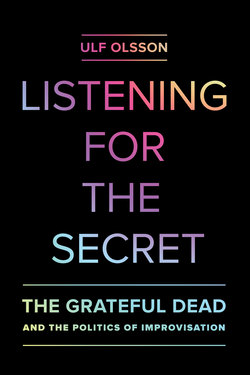Читать книгу Listening for the Secret - Ulf Olsson - Страница 11
На сайте Литреса книга снята с продажи.
ОглавлениеAcknowledgments
This book has been prepared, researched, and written in both close vicinity to and at a certain distance from its object. Closeness was granted me by the University of California, Berkeley, and the Grateful Dead Archive at the University Library of the University of California, Santa Cruz: Closeness both to the sources and to the air that the Grateful Dead breathed. But critical writing seems to also depend on a dialectic of closeness and distance: My employer, the Department of Culture and Aesthetics, Stockholm University, as well as the National Library of Sweden, Stockholm, have made my reading and writing from a distance possible.
The life and times of a rock band can be documented in different ways, and the Grateful Dead must be one of the most (if not the most) documented bands ever. Still, there is much detailed knowledge and atmosphere that can only be relayed orally. I am honored by the hard work as well as the friendship of Nicholas G. Meriwether, Grateful Dead Archivist at UC Santa Cruz, and a living source on the history of the band, written and oral. Nicholas is a historian, an utterly careful writer in his own right, as well as the most generous scholar. The work he has done for the Archive is what makes this and future studies on the band possible.
Other scholars, fans and skeptics alike, also have contributed—probably more than they realize. Peter Richardson (lecturer at San Francisco State University), who himself has written a splendid book on the band, generously read and commented on my manuscript. So did a few Swedish friends: Johan Fornäs (professor of Media Studies, Södertörn University College) offered a meticulous reading of my manuscript, as did my colleague at Stockholm University, Bosse Holmqvist (professor of the History of Ideas), and Erling Bjurström (professor emeritus, Linköping University). Johan Petri (Gothenburg University) shared his knowledge of the literature on improvisation. Stefan Helgesson and Frida Beckman, both of the English Department at Stockholm University, invited me to try out a few ideas in the form of lectures.
Two readers of the manuscript, unknown to me, generously shared their obvious insights and knowledge about the band in their respective peer reviews.
My San Francisco friend, “music industry veteran,” entrepreneur, free spirit, Jewish activist, and editor, David Katznelson, took me to different shows in San Francisco so that I could hear something other than just Dead music—and to have some “gris-gris” along the road.
While on the left coast, I have enjoyed the discussions and the erudition of the Frankfurt School Working Group, University of California, Berkeley, with Erin Greer and Megan O’Connor as its unifying center.
My editors at the University of California Press, first Mary Francis and after her Eric Schmidt, have believed in and supported the writing of this book.
Early ideas for this book have been discussed at different conferences. The open-minded and generous intellectual climate of the Grateful Dead Scholars Caucus and its annual congregations at the Southwest American/Popular Culture Association meetings in Albuquerque, New Mexico, have been of a fundamental importance: those gatherings showed to me that perhaps I could have something to say about a band, whose music I listen to and always will listen to. I hope this book fulfills that promise and indeed says something about the Grateful Dead that has not been said before.
My wife, Linda Haverty Rugg (professor of Scandinavian Studies, UC Berkeley), patiently corrected my English and drove me to Santa Cruz and San Rafael, Mountain View and Santa Clara, for archival or field studies. But Linda not only took the wheel when I was seeing double, her critical mind was always open to discussions on how to do things with words, and how to find out ways to make writing generate a shared understanding. Her probing questions, her deep understanding of language—written and spoken—and her demands for clarity drove me on, even when I found myself lost in writing.
Sometimes one loses oneself in writing—as well as in music. The Grateful Dead’s music has been and remains a deep well, one in which I find myself transformed, lost, renewed—or just happily smiling. The art, example, and work that define and inform the Grateful Dead phenomenon are the wellspring that nourished this volume and will continue to do so, for many others, for many years.
